PopCulture25YL looks back at the music, shows, comics, books and whatever else we want from the month that was September of 1994 to explore why they’re still relevant to us 25 years later. This week brings us The X-Files, Friends, Final Fantasy VI, the Golden Palominos, Page & Plant, and Korn.
VHS In The VCR
The X-Files S02E05- Duane Barry by John Bernardy
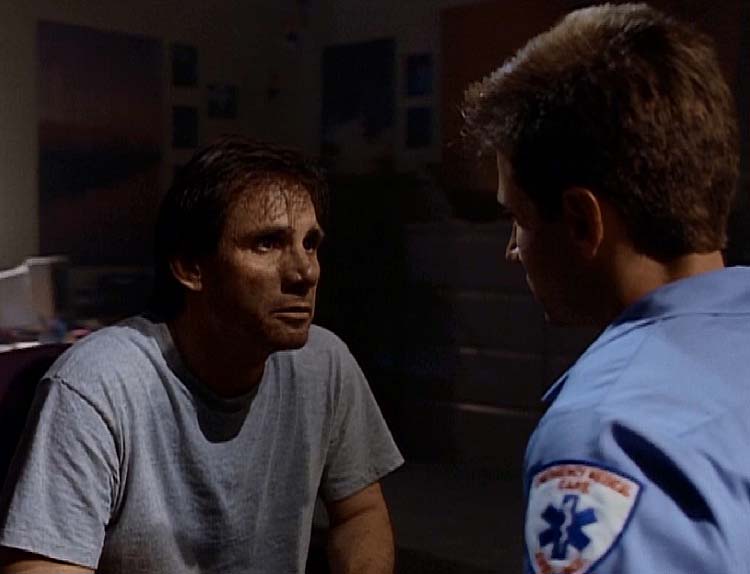
“Duane Barry “ is Part 1 of one of the best game changers in television history, and it still holds up against anything you could see on TV today, which is pretty good considering its 25th anniversary is this Monday, October the 14th.
I give Chris Carter a lot of crap for focusing on the plot and convoluted show mythology rather than focusing first on giving Mulder and Scully proper character moments, but that’s not the Chris Carter that wrote and directed this tour-de-force of an episode. This is back when the mythology was just being formed, and the story arc’s direction was rooted in the staff trying to write around Gillian Anderson’s real-life pregnancy.
This episode—and all the stuff involving Scully’s abduction—was a stop-gap move to explain why Anderson wouldn’t be in the show much at the beginning of the season that also keep things interesting while she was away. It’s an exercise in limitations, and wow did they ever succeed better than they could imagine.
Think about this: if Gillian Anderson hadn’t gotten pregnant, the mythology would’ve probably stayed closer in format to “The Host” and other case-of-the-week ideas like we got throughout Season 1. The staff would’ve figured out how to re-open the X-Files, and it probably wouldn’t have been because Scully herself was abducted.
I know we haven’t gotten there yet—that’s 25 years ago next week, in “Ascension”—but this episode sets up everything, and we’re only five episodes into the season. Stuff like this, you don’t expect these kinds of moves until later in a season. I mean come on, the season just started. Actual behind-the-scenes necessity created quite the element of surprise. Moves like this prove the heights a show can reach when it takes big chances.
The episode begins with quite the abduction scene set in 1985. I was worried about Duane’s dog as they show it getting a drink of water then laying on the bed, but they show it barking outside the house so at least we knew the pooch was okay. Any comfort from that was balanced out by Duane shouting “Not again!” The setup was that this would be the man’s first experience with aliens, but the implication is this is Duane’s life. A great way to establish his character.
After this we get an episode of highly tense but fairly standard hostage negotiation action, if you’re willing to ignore Duane’s motivation for taking the hostages in the first place. Mulder’s called in due to his experience with abduction cases, and he eventually gets into the room with Duane and the hostages. You can tell he wants to believe Duane’s story, thanks to still wanting answers about his sister Samantha. But Duane starts out by feeling patronized when Mulder starts talking about how abductions work. “I want some honesty,” Duane shouts. “I want some respect.” You really feel like he’s going to start shooting everyone while he waits for the aliens to tell him where he’s supposed to go next. Steve Railsback created an absolutely compelling and memorable character in Duane Barry. You never knew which way he was going to go. I’ve seen this episode a number of times and I couldn’t even remember. So good.
If this were a Season 1 episode, the episode would’ve ended after the ambulance drove away with the subdued Duane in it, with Mulder telling Scully “I believed him” and Scully countering with “Sometimes when you want to believe so badly, you end up looking too hard. But when the ambulance pulls away with only seven minutes and 50 seconds left in the episode, it decides to shift into an even higher gear.
Agent Kazdin (played by CCH Pounder eight years before her tenure on The Shield began) who ran the earlier hostage negotiation, called Mulder to Duane Barry’s hospital room to show Mulder that X-rays showed implants right where Barry said they’d be, and verified extremely precise drilling in Barry’s teeth. Looks like he was indeed telling the truth. Then we see Mulder giving a vial containing one of said implants to Scully. She assumes it was shrapnel, then takes it to ballistics where they notice extremely small etchings that looks like a bar code. Next she’s at a grocery store where she takes the opportunity to scan the implant at the register’s scanner. Everything goes crazy and the register begins to run some kind of process that can’t stop. There’s definitely something to that.
We next go to Barry’s room where we see white light and aliens once again, but this time Duane takes off everything and escapes by knocking out a security guard with a fire extinguisher. Next scene we get has some of the highest stakes we’ll see over the entire show.
It’s raining. Scully is in her home and she’s leaving Mulder a voice mail with her findings: “What the hell is this thing, Mulder? It’s almost as if…someone was using it to catalog him.” Then she hears a knock, sees Duane Barry just outside her window, and the final moments take place just off camera while we watch her phone delivering the whole event to Mulder’s answering machine. We hear Duane Barry saying things like “come on” while Scully shouts “Mulder! I need your help!” Then the screen goes black and the words type across the screen: To Be Continued.
So much happened in these last eight minutes that I’m shocked it wasn’t an entire half an episode. The moments at the grocery store and Scully’s apartment are so big in my memory I remember them taking more room in the episode as well. So much ground covered here…it still gobsmacks me how well this episode turned on a dime.
After the final scene in “Sleepless” where CSM implied to Krycek that the Scully problem had a solution, this was the last way we thought they’d be able to solve it. This seems like way out of left field, but maybe it wasn’t. How did Barry know how to find Scully? Was is because the chip was scanned? Was it because Krycek set Mulder up on this case knowing full well Scully would become involved? Were the government agents that work with the aliens in charge of programming Barry with the information of Scully’s address? He was waiting for the aliens to tell him his next move, after all. And they communicate without using words, Duane verified that when he had Mulder as his hostage.
I honestly can’t remember how Duane Barry got there, or why he chose Scully…does the show ever reveal this information? Does it matter? Honestly, not really. I just know I’m almost as excited now to go up the mountain next week as I was the first time I watched this 25 years ago.
Friends- The One With George Stephanopoulos by Abbie Sears
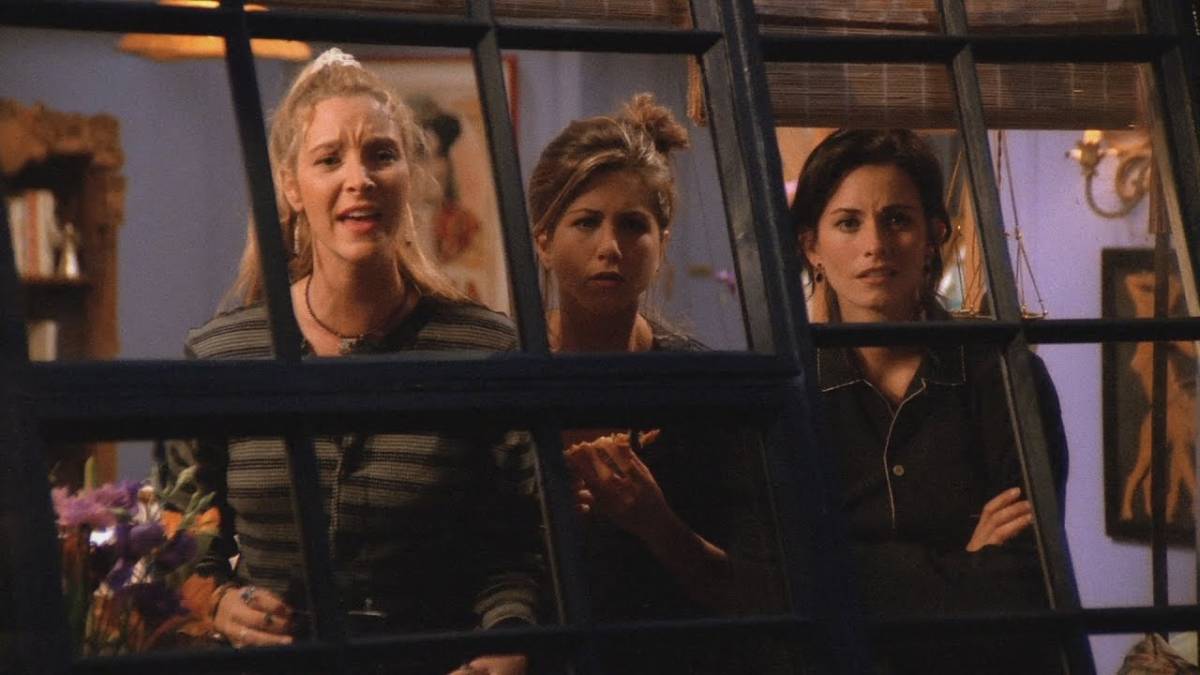
“The One With George Stephanopoulos” came to our screens on October 13th, and it’s a bit of a rocky road for the whole gang. Ross spends this episode reminiscing about his relationship with his ex wife as it is the anniversary of the first time they had sex. We later find out the truth that night was actually the night Ross lost his virginity and so it holds a deeper meaning to him. The guys take him to a hockey game and he ends up being hit in the nose by a hockey puck just when he thinks his day couldn’t get any worse.
They encounter the absolute worst receptionist in the hospital, and isn’t that always the way? You break your nose and the receptionist is on the phone complaining that they’re not entirely satisfied with this candy bar.This stands out as a quirky, outspoken, “New York” type character that Friends really nails throughout its 10 seasons.
On Rachel’s side, she gets her first pay-cheque and realises it’s hard to live financially alone. While her, Phoebe and Monica have a slumber party she brings them down to her level while having a breakdown about her non-existent life plan. I personally relate to Rachel trying to describe how she feels about her life and not coming up with anything, things are complicated, but I think Phoebe hits the nail on the head with “floopy.”
This episode takes me back to being in high school when sleepovers with your friends were a thing and you’d talk about boys and the kind of future you want, usually you’d end up planning to live together and organising your dream house! In a way, the life that the friends gang have is the life most people want when they make these sleepover plans with their friends. Isn’t that ironic?
The ladies order pizza and are accidentally given a pizza meant for George Stephanopoulos, a cute man who lives across the street. This leads them to the balcony where they end up gossiping and confessing things from their past and it seemingly uplifts the spirits of them and of this episode. This is a great episode because we really spend quality time with the whole gang and learn about the history of their relationships. In the end the group come together and Rachel discovers her “magic beans” in her friends and realises she has all that she needs right here.
Mashing Buttons
Final Fantasy VI by Conor O’Donnell
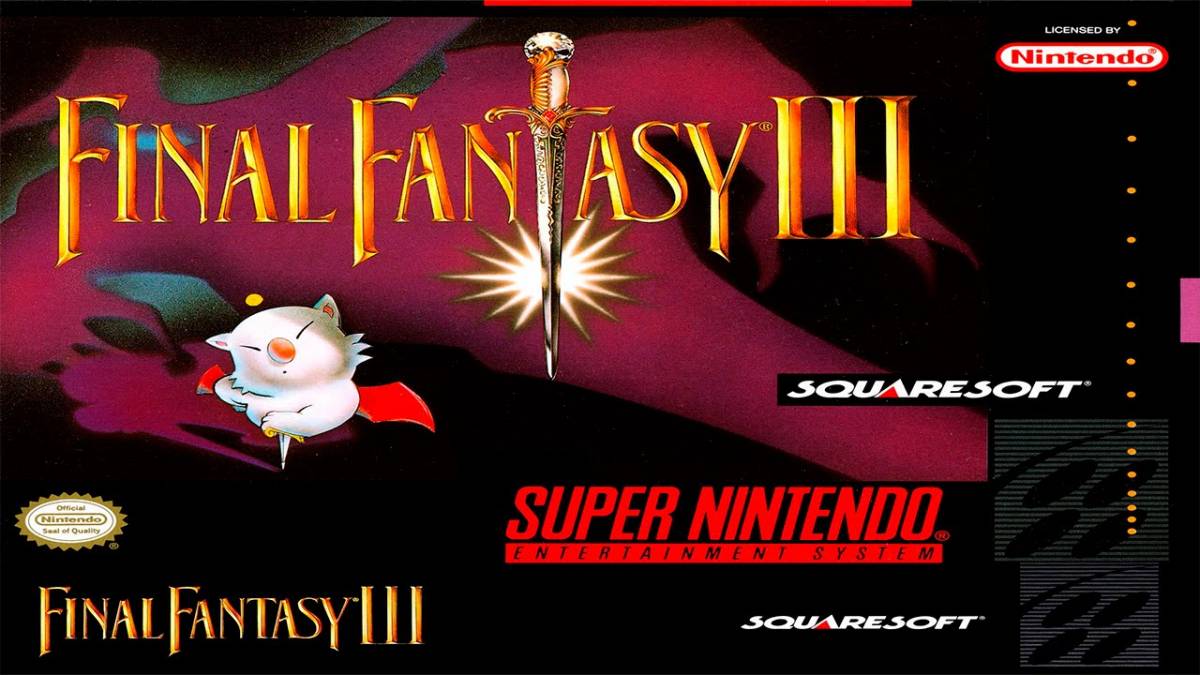
RPGs weren’t ubiquitous back in 1994. Especially in the United States. Final Fantasy VII hadn’t come out yet. The NES was my first system, so my introduction into RPGs was the original Final Fantasy. Boy did it have its flaws.
*Attack*
*Ineffective*
Ensue controller throw.
My RPG fandom blossomed with the release of Final Fantasy IV, FFII in the states. Combat was smoothed out. A cast of characters would leave and join your party. Graphics were much improved. Music and sound effects made a huge jump in quality. The length was perfect allowing for multiple enjoyable play-throughs.
Nothing could top Final Fantasy IV, right? Final Fantasy VI—FFIII in the states—had this weird white teddy bear on the cover art. What is this? This isn’t Final Fantasy. How wrong I was. Back in those days, you couldn’t look up game play footage online or check out day one reviews. I vividly remember going to a friend’s house with my brother and saw a character named Sabin deliver one of his Blitzes.
Not only did this quickly turn into one of my favorite games, this is renowned by many as the best Final Fantasy game. FFVI expanded and perfected many of the innovations created from the previous iterations in the franchise. What stands out most is the characters, story, and its epic soundtrack.
FFVI has the strongest ensemble of characters. You care about and remember all of them. They all share the spotlight with their unique stories and abilities. This game also doesn’t have a main protagonist, a rare occurrence in the franchise going forward. The most memorable character without a doubt is its villain: Kefka. His evil laugh will forever be etched in my brain.
FFVI felt grandiose in scale. Your decisions felt important. Eventually the story reaches a climax to a near ending of the world. You’re led to believe this is the end of the game. There’s an even
opera segment in this game. While the 16-bit opera music doesn’t quite hold up, listening to orchestral covers shows off the monumental effort composer Nobuo Uematsu put into this game.
My favorite aspect of FFVI is being able to mix and match your party. With 13 characters to choose from, you have a variety of options and combinations. My only gripe with the game is the Esper mechanic which allowed any character to learn any magic spell. It felt like it broke the rules
of Final Fantasy.
Final Fantasy VI holds up better than most in the franchise. It has been ported to the PC but the original is still the recommended version to play. Luckily, it’s included on the SNES Classic. What’s my favorite Final Fantasy? Personal favorite would still be FFIV but anybody starting out in
the franchise, or in RPGs in general, should start with FFVI.
CDs on Rotation In Our Six-Disk
The Golden Palominos- Pure by John Bernardy
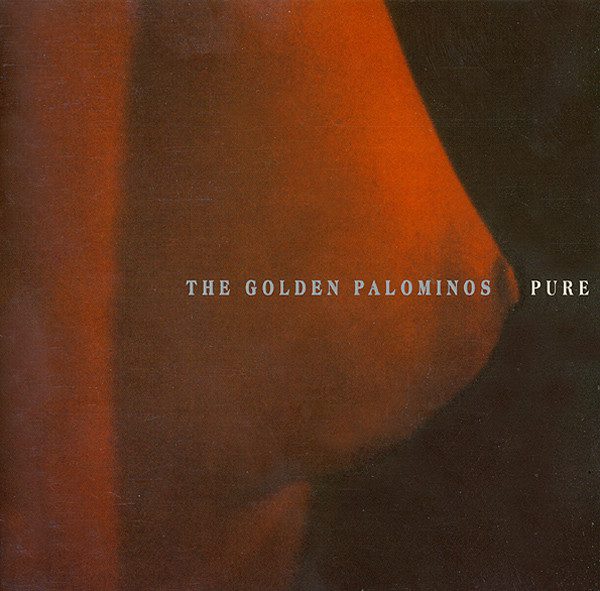
Pure is an art rock call for help about people barely hanging on, with music that floats in a vibe. It’s very poetry scene and this band would absolutely kill in the Twin Peaks Roadhouse.
The band leans heavily into the existential, and they can go full beatnik. They remind me of a cross between the Smoke Faeries and PJ Harvey, and sometimes they can whisper lyrics in a way only Neon Genesis Evangelion’s Rei Ayanami could deliver properly. And these are all good things.
Throughout the album there’s a funky wah wah guitar, but it’s usually juxtaposed against lyrics such as on the song “No Skin” where the vocalist repeats “everyone I see is missing something.” The album is also full of slinky bass lines not unlike the French electronica band Air. It’s dance-adjacent with its musicianship but nothing’s overly bouncy.
Yet still the song that sticks out most is the one that made me buy the album: “Little Suicides.” That song fits in with mood of the album’s lyrics, but it only has acoustic guitar and bongos. It’s haunting, and it owned me. They didn’t play this nearly as often as Pearl Jam, Sarah McLachlan or Nine Inch Nails (1994, what a year!) but I yearned for this one to come on just as much as Portishead’s “Sour Times.”
I can see why the Golden Palominos aren’t as remembered as all the other bands from this year, but they’re special all the same and I recommend you take a look into their work. Especially if you’re in a funk and you need that kind of funk. It might just help bring you out of it.
No Quarter: Jimmy Page and Robert Plant Unledded by John Bernardy
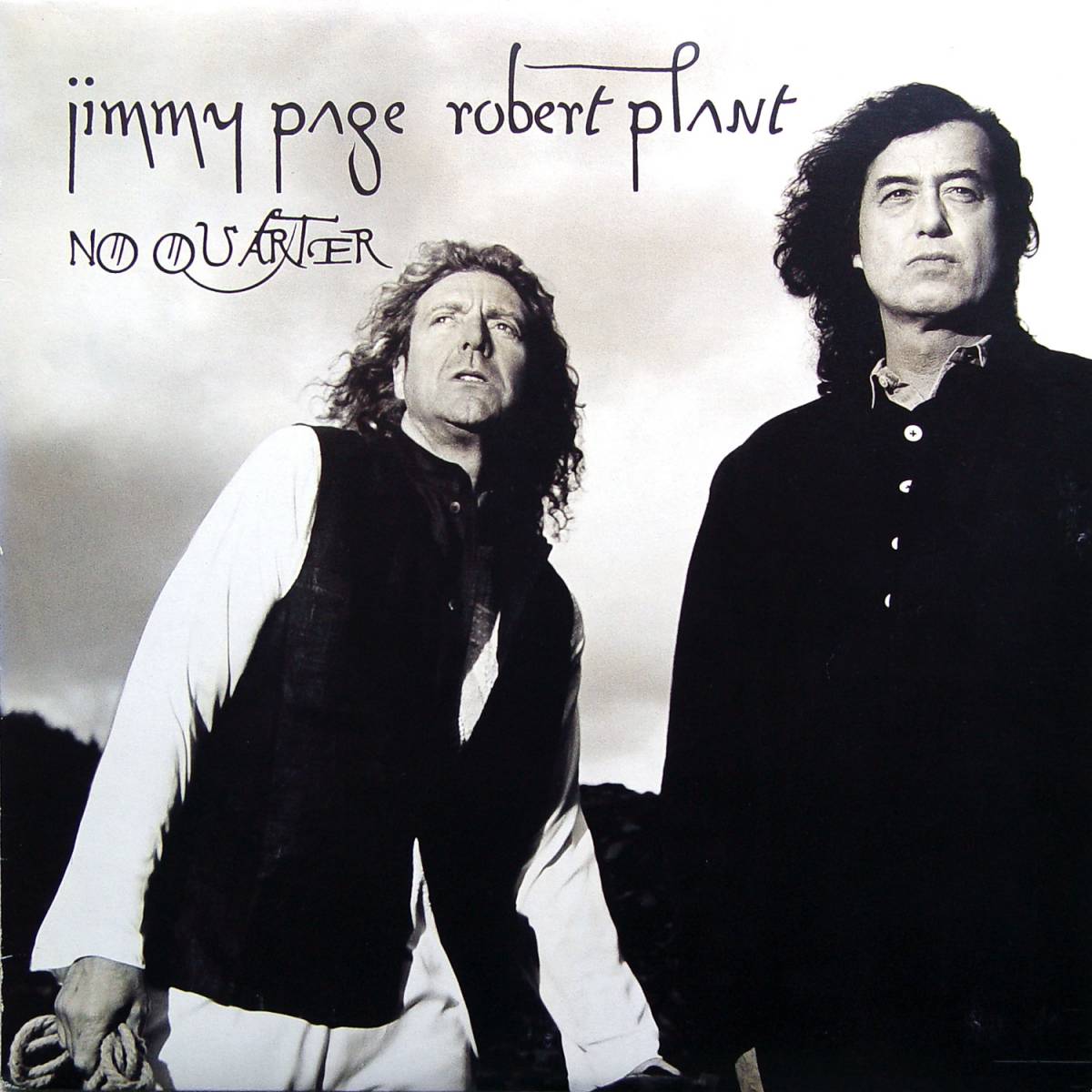
I was going through a giant Led Zepplin phase in 1994. We all were. The Classic Rock radio format was huge then, and in Chicagoland we had a station that would play anything from “The Low Spark of High Heeled Boys” by Traffic to the full sized version of Iron Butterfly’s “Inna-Gadda-Da-Vida.” If you can hear long-form giants like that on the radio, of course every single Zeppelin song was fair game. So when Page and Plant reunited and released a new album arranging some of their classic songs, of course I needed to be there for it.
The album is an audio version of the 90-minute concert MTV-produced concert special. Robert Plant did vocals and Jimmy Page played guitar as normal, but they were backed by a Moroccan string band and an Egyptian orchestra, so it definitely has a completely different flavor than the original songs. As an experiment, it’s a success. As an essential Zeppelin album though, it’s not quite there. You can get a good flavor of the album here with the album’s version of “Kashmir.“
Korn- Korn by Will Johnson
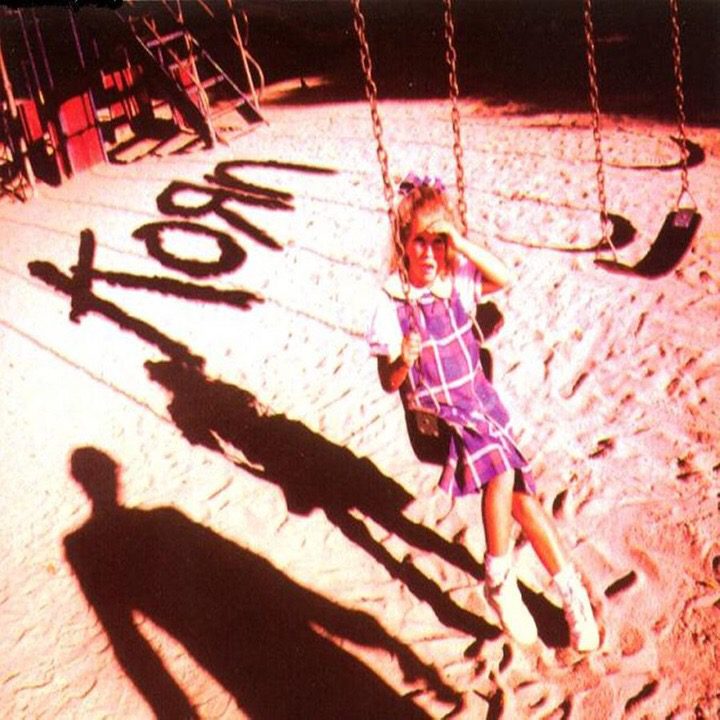
For metal enthusiasts like myself, saying the words nu-metal can be a perilous idea when surrounded by your loyal companions. It is a dirty set of words and, frankly, also sad ones. Nu-metal represents the last gasp of metal at its commercial peak. When the dust settled on all the sold-out arena tours of Limp Bizkit, Incubus, and Korn, metal became a diseased dinosaur, with only a few acts surviving to see the next century.
The ‘70s and ‘80s boasted the heyday of heavy metal: the godfathers themselves Black Sabbath, new wave of British heavy metal acts like Iron Maiden, Saxon, and Motorhead, the underground thrash movement, starring the big four of Metallica, Megadeth, Slayer, and Anthrax, and the popular (if insipid) hair metal acts like Motley Crue, Poison, and Ratt, to name a few. Metal was both a grassroots, tape-trading movement of the disenchanted and disenfranchised but also a big seller at Tower Records. Then the ‘90s happened.
Grunge—a heavy-metal-adjacent brand—burst onto the scene, ignoring the histrionics of alternate dimensions and demonic realms that the burgeoning doom/death/black metal bands espoused as well as jettisoning the anti-war, anti-political preaching from the aging thrash artists. Grunge went to the heart of the artists singing and performing; looking inward at the torture of the soul as opposed to the decay of the earth and society. Needless to say, grunge spoke to people on a personal level and became a new movement. Also, at the same time, the emergence of gangsta rap served the same purpose with its dramatic and violent stories of personal struggle touching people deeper than the more general themes of metal could.
Some metal bands worked to change with the times. Anthrax and Metallica, specifically, dramatically changed their sounds to the point of being unrecognizable (to many). Many metal bands simply died, never to return. But metal still had one last trick up its sleeve and like Frankenstein’s monster, it was formed from multiple different pieces of many different feelings, moods, and sounds. Metal thought: what if we got even more personal than grunge? What if we got just as violent as gangsta rap? What if we took the known metal facets of heavily distorted riffs, blast beats, and screaming but also added sound effects, disc jockeys, hip-hop beats, rapping, and rivalries? What if we just took vulgarity and noise and mashed them together? It would certainly at least get people’s attention, right?
Though it wasn’t permanent, and it certainly doesn’t stand the test of time, nu-metal was born: a fusion of so many different genres that it became one of its own solely for its unique blend of all that we knew before. It was bold, it was noisy, and it was certainly attention-getting. Sure, Soundgarden lamented the oppression of a depressing day but nu-metal godfather Korn explained the reason for the depression, in all its gruesome detail.
And that brings me to discussing Korn’s debut, the self-titled album that may be one of the only complete albums they’ve, and in turn, nu-metal, has produced that 25 years later still packs a punch and stands the test of time. While Korn’s debut was rooted in more traditional metal, using some standard—but crunchy—riffs and expected time signatures, the album goes out of its way to make sure it is remembered for more than its sometimes repetitive song structure.
For one, singer Jonathan Davis reaches deep inside to explain to you, or simply the void, about the inner demons that feed on him, wisely asking the listener within the first 48 seconds of the album “Are you ready?” Be it the raw feelings of isolation and being misunderstood in “Faget”, the need to understand the violent attention paid to him in “Clown”, the dismay at someone not being true to themselves in “Fake”, and, most shockingly, the cries for help when being literally raped by a parent, as depicted in “Daddy”, Davis never lets you forget he’s damaged and he’ll yell, scream, and sonically gyrate until you understand.
Also, Korn took the basic metal mold and tried to subtly subvert it, keeping the listener, already subjected to unpleasant lyrical torment, off-balance. Screw up the beginning of a track? Share the recording of the band yelling at each other about it! Need to add some disturbing clicks and off-putting mouth sounds to add some atmosphere? Sure, go right ahead. Feel like a nursery rhyme from hell needs that extra layer of weirdness? By all means, add a damn bagpipe section! Korn would later take these ideas to the extreme, barely constructing albums full of songs but instead tomes full of bizarre onomatopoeia. But for Korn, they lured you in with the expected template for metal and then threw in some weirdness to keep you wondering “what’s next?”
Korn does not have a lot of hip hop beats or rapping like many nu-metal albums do, but its ability to create an aural monster with touches of subversion and unpleasantness certainly helped set the tone for future releases not just by Korn but by those influenced by Korn. Which brings me back to mentioning nu-metal to metal loyalists of today, who worship the legends but sneer at Korn and their descendants. Discussing Korn, in general, will likely give you a few rolled eyes but there is begrudging respect for the first album. It’s heavy enough, and not weird enough, to be the example of nu-metal though, in the end, it is one of the first albums to define the genre, for better or, most likely, for worse.


